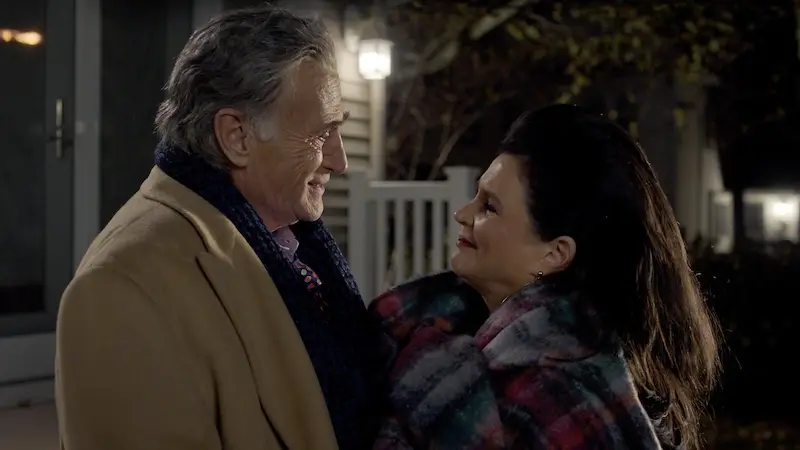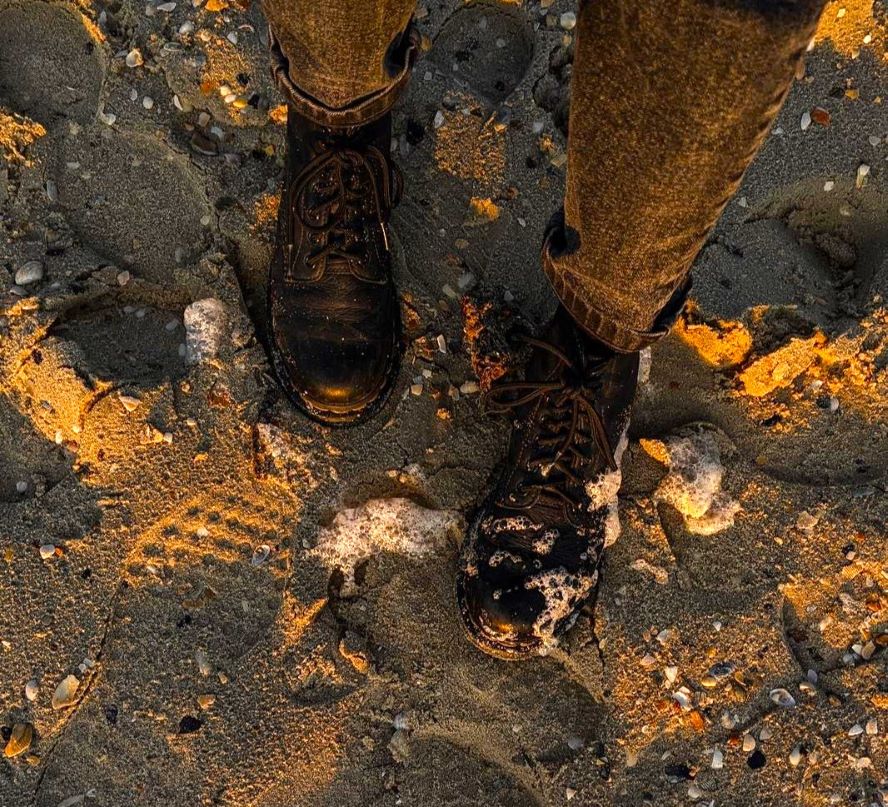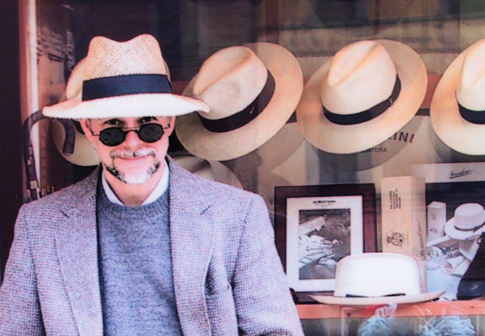Interview with Emmy-winning Julia Ormond, co-star of movie Here’s Yianni!
Cinema / Interview - 25 November 2024
The actress discusses her performance in the new picture, premiering at the Torino, Italy Film Festival, & more

Julia, you started in theatre, then into much TV work, and transitioned well from television to film. Do you approach all roles in each medium the same, or do you tailor your focus and methods differently?
Well, the transitions are really about size, and they're really about the size of the movements that you make, and the kind of movements that you make within the frame. So with theatre, you could be in the ‘round’, for example, and you could be surrounded by audience, in which case there's a kind of naturalism that you can get away with. Whereas, if you're in what's called the ‘pros-arch’ (proscenium arch), the frame is the shape of the stage, and the sort of ceiling of that, and there is something about theatre work as an actor that your movements need to not be naturalistic on some level. You try and make not having naturalistic movement more naturalistic.
“Here's Yianni!” is going to be premiering at the Torino Film Festival and has been at some other festivals already. I got to watch it the other day. The picture is inspired by writer and director Christina Eliopoulos’parents' lives as immigrants from Greece, her father's own battle with dementia, and the effect that had on the dynamic between her parents, him and his wife. When a story like this is so personal, what's important for you to keep in mind when you're trying to bring a character like Plousia and the greater story to life on the screen?
I love your questions, Jake. You've done this before, haven't you? (laughs)
So what's important to me when it's based on somebody's real life is that they both feel the right balance of being challenged around the story so that it's not too sentimental, and that it's as interesting a story as if it was completely fictional and made up. But also, you're really honoring them. It was super important to me. This is a tragedy. I mean, it's like, yes, it is about Yianni and his getting dementia, but it's also a story of how dementia impacts the whole family. Family, friends, everyone who knew him, you're dealing with the impact of dementia. And I just found it, I found it really interesting when you have something that's essentially a family tragedy that is threaded through with so much whimsicality.
Plousia, in front of others, braces this real strong image, one of support for her husband, one of confidence, love, and capability, like she's going to be able to deal with this. But one of the first times we see them alone at home, and she's observing Yianni in his state, you see this storm of emotions that's swirling in her. She's smiling, trying to entertain where his mind is going. A little tear comes down her cheek that he seems oblivious to. There all these emotions on her face, and as your character, you wear them so well. You’re trying to depict this woman who's worried, she's sad, she's fearful, she's faithful, without overdoing it. While working to show her emotional state, but show it balanced and paced throughout the film, what was your approach?
You know, it's interesting. Yeah, good question again. It also actually goes back to your first question about what's the difference between theatre, film and TV. Because in theatre, you get to play the whole arc every night from beginning to end, right? So you get to go through it, you get to rehearse the whole story for three weeks or whatever your rehearsal period is. But on film and television, it breaks it down. In film, you know your start, middle, and end. TV, you have no fucking idea what's going to happen, quite frankly.
You take it on, you like the thing, you like the people, but you have no idea where they're going to take it, especially if it's serious.
Your answers are better than my questions, they just thread right into my next one. There's a scene where the actual TV talk show host, Jim Hopper, played by Eric Roberts, arrives at Yianni and Plousia's house, and your character asks, “am I hallucinating?” Throughout, we get reminded that the film is telling the story in parts through Yianni's eyes, as his dementia progresses, and at times through your character's eyes as she's navigating how and what to do, as well as the eyes of the other characters. Do you think that there's a significance to the film challenging the audience's own notion of reality, perception of reality, and dreams, by alternating through these different lenses in which we see the movie unfold?
I love it when films do that. I think for me, it seemed quintessentially, sort of a Good Morning America kind of TV style to go and see this local person, and just the way that it plays out, it's a stretch in terms of suspending your disbelief as the audience like it does. It slightly pushes you, but it also, I think, is quite funny because from
that perspective, it's like ‘okay what what's happening?’ you know it's sort of difficult. I think for me what it did, and I'm not sure if this is what Christina meant through the story, it was one of those life moments when you have the sense that the universe has your back, that there's something other going on.
Being that you're such a season veteran of the craft, what's it like working on a film that's written and directed by fairly new auteur like Christina.
Honestly, I’ve worked quite a few times with first time directors, and I get such
a kick from it. It is so hard to get a film off the ground. It's so hard to get something done. It's a high mountain to climb to tell something that's a personal story. And it's really quite a privilege to be part of it. I think for me, there are certain, obvious things like your budget restrictions, you know. I will tell you, this was not an easy one to make. Boy, this one was not easy. She probably won't say that because it's inelegant for her to say that or inappropriate or whatever, because obviously, we're all thrilled that we got the opportunity to make the movie, but there were things that get lost in the story, stuff that gets lost and all the rest of it.
I appreciate your candidness. Not many people on a cast will talk about the effects of shooting on a smaller budget.
I would also say that the flip side of it is, I'm not particularly a believer that having loads and loads and loads of money makes it a better movie. I've gotten to work with, in the past, a few Eastern European crews, and you know, the war in Ukraine might not be particularly popular right now, but there is something about squeezing what people can have that actually forces you to make a creative decision that's better. And that would never have happened if you weren't put in that situation. But I do think that that's something that comes with experience.
In the picture, the character Jimmy, (Kevin Pollak) is void of any illness that we know of. Certainly, he does not have dementia. His personal life is in disarray. Yet, he looks at Yianni like he is not the same, almost as if he's not even human anymore, and views your character like she won't be able to deal with this. But as we watch their loving bond, we see they have what he doesn't. Was that contrasting dynamic mentioned or brought up during shooting? Was it a notion in your mind?
I definitely think that was there in the movie. Yeah. I think for Christina, a lot of the telling of the movie is not just about telling the story of her dad, but also telling the story of her mom. I can say that even though I got to play her mom, it's... their love was what got them through.
I imagine acting can be a very demanding, consuming profession. Finding time for much else outside of it is already tough. But you participate in much activist work, a lot of raising of awareness. Aside from the impact that that work has, does the nature of doing it help keep you grounded or balanced while working in the entertainment industry?
Yeah. That work, just to elaborate on it, the activism that I do is activism on human rights, but the real focus in the last two, three decades has been on human rights and working against trafficking, slavery, and forced labor, child labor. My nonprofit has focused on cleaning up supply chains and ensuring that human rights and decent work and decent wages are given to workers, because that, for me, is the goal. It’s that we measure our relationship between planet and people, because when we measure it and we measure it credibly, then we can actually make changes that are positive and move forward.
Yeah, so a lot of my work has been around that. I would say it is very grounding. It's very grounding I think for anybody in any profession.
I consider myself to have been really blessed to have been given the opportunity to go and investigate this issue because not many people get to do that. Politicians don't get to do that. I remember working with one UN guy, and we were visiting a sex trafficking shelter in India, and I had been sitting with some of the survivors, talking to them, and understanding and getting their story better. As we came away from it, he said, “you know, it really is essential because I'm a white male UN official. It's totally wrong, or it feels totally wrong, and I would argue maybe it is totally wrong for me to sit there and put that girl through that story yet again, or that boy”. So, it really is about finding the right person to be the listener, finding the right person to be the carer, finding the right person to be, you know, a change agent.
So that work has been, yes, huge for me. It's been huge for me. The thing about acting, and I think it's the same if you're a painter, it's the same probably for you on some level in terms of what you do, that there's a lot of pressure to tell yourself that it is who you are, versus it's what you do. For me, the trafficking and slavery work speaks more to who I am, and it's satisfying in a way that enables me to have a little bit of a healthier, I guess, relationship to the acting.
When I ask somebody questions, I never have an answer I want to hear, or expect to hear, but that was a beautiful one. Thank you for taking the time with me, it was a pleasure.
Thank you, Jake, you too.
© All right Reserved











